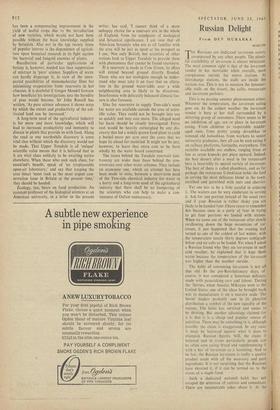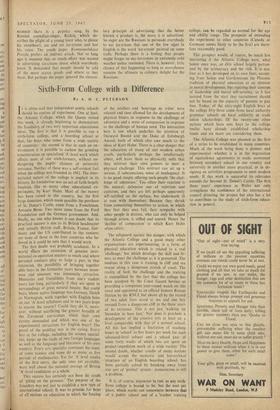Russian Delight
From DEV MURARKA
MOSCOW
rrt-IE Russians are dedicated ice-cream eaters, I unsurpassed by any other people. The plenti- ful availability of ice-cream is almost infectious. The most common sight is that of the ice-cream vendor in her inevitable white overalls, most conspicuous outside the metro stations. At interchange stations, the stalls are inside the stations too. This is not to mention the innumer- able stalls on the streets, the cafes, restaurants and ice-cream parlours.
This is no passing summer phenomenon either. Whatever the temperature, the ice-cream eating goes on. In the coldest weather the ice-cream vendor is busy at her stall surrounded by a shivering group of customers. There seems to be no inhibition of age, sex or place in ice-cream eating. From children to respectable middle- aged men, from pretty young devushkas to wizened old babushkas, from workers to senior university graduates, they all can be seen eating it on railway platforms, footpaths, everywhere. The varieties available are endless, ranging from as low as seven kopecks per piece upward. Indeed, the best dessert after a meal in the restaurants here is invariably its special variety of ice-cream. The best of them is called plombiere, and so far perhaps the restaurant Uzbekistan holds the lead in serving the most delicious blend in the town, enriched and garnished with nuts and cherries.
Yet one has to be a little careful in ordering it. The waiters can be very exuberant in serving it. Ask for one portion instead of the usual two. and if your Russian is rather shaky you are likely to be handed four. I have cause to remember this because once in a party of, four in trying to get four portions we landed with sixteen. When we came out of the restaurant after slowly swallowing down the huge mountains of ice- cream, it just happened that the evening had turned to one of the coldest of last winter, with the temperature nearly thirty degrees centigrade below and no cabs to be found. Yet when I asked a Russian friend why they ate ice-cream in such cold weather, he explained that it kept them warm because the temperature of the ice-cream was higher than the weather outside.
The habit of consuming ice-cream is not all that old. In the pre-Revolutionary days, of course, it was considered a luxurious delicacy, made with painstaking care and labour. During the 'thirties, when Anastas Mikoyan went to the United States, one of the ideas he brought back was to manufacture it on a massive scale. The Soviet leaders probably saw in its plentiful distribution a symbol of the new equality of the masses. The habit has survived and seems to be thriving. But another advantage claimed for it is that it is a cheap and popular source of nutrition. There may be something in it, although possibly the claim is exaggerated. In any case. it must be balanced against what it does to plumpish Russian figures. Still, the claim k believed and in trains particularly people can he often seen eating bread and supplementing it with a bar of ice-cream as a leavening. And to he fair, the Russian ice-cream is really a quality product made with all the necessary and pure ingredients. It is not surprising that the Russians have elevated it, if it can be termed so, to the status of a staple food.
Such a dedicated national habit has not escaped the attention of satirists and comedians. There are innumerable jokes about it. At the
moment there is a popular song by the Russian comedian-singer, Raikin, which de- scribes the plight of a young lover who, to please his sweetheart, ate and ate ice-cream and lost his voice. The youth paper Komsomolskaya Pravda prefers an indirect attack. Not so long ago it moaned that so much effort was wasted in advertising ice-cream about which everybody knew. It demanded that people should be told of the more scarce goods and where to buy them. But perhaps the paper ignored the elemen-
tary principle of advertising, that the better known a product is, the more it is advertised. So eager are the Russians to persuade everybody to eat ice-cream that one of the few signs in English is the word 'ice-cream' painted on some stalls. Perhaps there is a feeling that people might forget to eat ice-cream in extremely cold weather unless reminded. There is, however, little chance of this happening so long as morojhenoe remains the ultimate in culinary delight for the Russians.







































 Previous page
Previous page